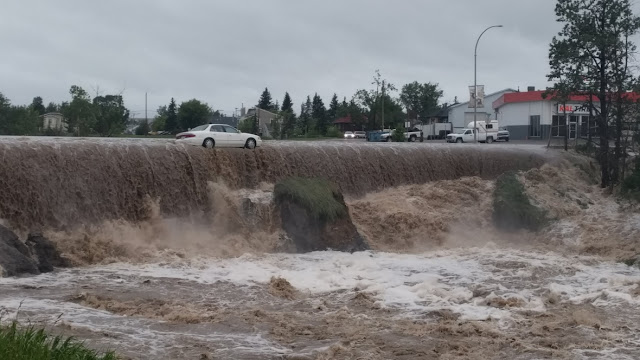Flooding
I first drafted this post well over two years ago, and for some reason, I never hit
"publish". Maybe because this post just seemed to be too real, too honest. It felt raw at the time, with cognitive flooding fresh on my mind (as it were). I knew what was causing my 'overload', but it was still hard not to feel abnormal, unusual, dramatic.
"publish". Maybe because this post just seemed to be too real, too honest. It felt raw at the time, with cognitive flooding fresh on my mind (as it were). I knew what was causing my 'overload', but it was still hard not to feel abnormal, unusual, dramatic.
I'm beyond fortunate that I only deal with flooding now on very rare occasions when I'm overly tired, and not every-time I'm in Walmart. Partly because of how I've structured my life, even pre-Covid, but in large part due to the tremendous healing my brain has experienced in the past few years. I'm beyond blessed. This is no longer my day to day reality.
But please read anyway, because it's still a reality for many others with brain injuries, and they need you to understand, as well as you can.
This is a picture of a devastating flood in British Coloumbia. We hear a lot about flooding, the devastation, the belongings lost, the lives in danger, etc. I think we're all aware that floods are dangerous, even if we don't have personal experience with it. There's movies, books, tons of stories contain flooding as a catalyst, the turning point in the story. A family loses everything in a flood....but then they realize all they really need is each other.
Sound familiar?
When we think of floods then, we think of awfulness, loss, maybe injury or death. But we also think of overcoming, of that American spirit of not being beaten by anything (my thoughts on that would comprise an entire other blogpost but I digress) Come hell or high water (as it were), we are Americans gosh darn it and we will persevere.
There's a new, more personal meaning to flooding for me. When I think of flooding, I think first of mental flooding. Mental flooding occurs after a brain injury like a concussion or a stroke, any injury to the brain, really. Your brain is suddenly unable to filter out unnecessary information and is actively processing Every, Single. Thing. It's like being blind and seeing far too well all at once. The lights become too bright but everything else is lost in a blur. You become antsy and unsettled and every sound and light source feels as though its coming directly to your body and stealing bits of energy and life away. It's much like what I've heard described as sensory overload, experienced by people on the autism spectrum.
(below please find this excellent video from the Northern Brain Injury Association that explains it far better than I could:
Flooding is one of those things that's hard to explain if you've never experienced it, because there's no real reason that a typical 23 year old woman should burst out crying in Walmart while shopping and yet it happens. I've gotten better at recognizing when I'm close, but realizing that this was a 'normal' part of having an injured brain went a long way toward helping me, simply because I knew that I wasn't alone in that feeling. It didn't make me broken or stupid. It just meant I had an injury. And just like you can't pitch a baseball game with a broken arm, you can't function normally with an injured brain.
I highly recommend you watch the video for practical steps to help the people in your life avoid flooding, but speaking from experience, just knowing that other people believe me and recognize it as valid is huge in helping me.



Comments
Post a Comment